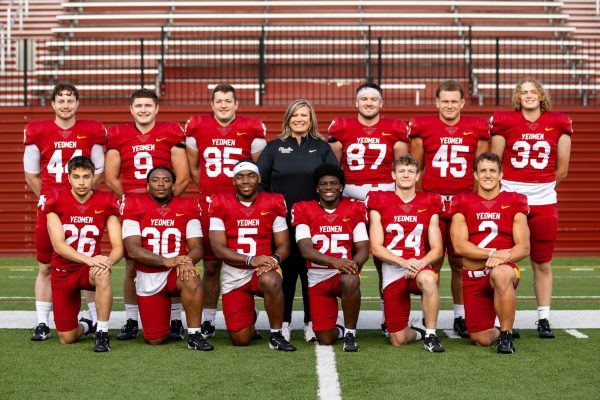Swooshes Up in Ashes, Nike Up in Shares
Nike’s close-up image of Colin Kaepernick’s face reads: “Believe in something. Even if it means sacrificing everything.” At the bottom: the classic swoosh followed by Nike’s slogan, “Just do it.”
The ad, which first surfaced in tandem with the opening game of the 2018 National Football League regular season, references Kaepernick’s now-infamous decision to sit and then kneel during the National Anthem at an NFL preseason game.
Kaepernick, who has not played a game since that moment two years ago, originally sat to peacefully protest racial injustices in the United States, but then decided kneeling would show more respect for veterans.
Nike’s ad, similar to Kaepernick’s original action, has inspired great controversy. The internet has been showered with thinkpieces, stock forecasts, and tweets, all with different takes on the image, its meaning, Nike’s controversial labor history, and its huge financial gain.
Some people have reacted negatively by burning their Nike shoes and cutting swooshes off their apparel. On Sept. 3 the hashtags #JustBurnIt and #BoycottNike were trending on Twitter. Others have lauded Nike for rolling out a powerful and activism-centric ad campaign.
Those who support the ad have shared past Nike campaigns that they think display the company’s commitment to equality and solidarity, including those released during Pride Month June 2017 to honor the LGBTQ community. This ad showcased vogue artist Leiomy Maldonado against the backdrop of an inspirational, emotional narrative describing Maldonado’s progression as a dancer.
In some ways, the controversial public reaction has become bigger than the ad itself. College senior and student-athlete Kaylee Elliott felt conflicted about the issue.
“I’m a little unsure about how I feel about Nike doing it,” she said. “I’m a hypocrite — I like their shoes. But I don’t agree with them making a profit on this campaign, especially when they’re committing human rights violations in other countries. It’s hypocritical for them to be profiting off of activism in our country while violating people’s rights in another.”
The public outcry has not been limited to individuals — some institutions are also making public stances on the Kaepernick ad.
Several NCAA colleges and universities have exited apparel contracts with Nike. Liberty University — the largest private, nonprofit university in the U.S. and one of the largest Christian universities in the world — is the first and, thus far, only Division I institution to start a conversation about leaving Nike over the ad.
“If Nike really does believe that law enforcement in this country is unfair and biased, I think we will look around,” Liberty President Jerry Falwell, Jr. said to USA Today. “But if it’s just a publicity stunt to bring attention to Nike or whatever, that’s different. We understand that. We understand how marketing works. But they’re going to have to convince us that they’re not proactively attacking law enforcement officers and our military. If that’s the reason behind using this ad, we’re going to have a hard time staying.”
Elliott, a Virginia resident who lives 10 minutes away from Liberty University, stated, “I believe in God and Christianity, but I don’t think institutions should have that sort of influence over students and their students’ political views. But I also feel like given the type of students that attend Liberty, they’re not going to protest it.” She said, “Regardless, you can’t have an institution telling people what’s wrong and right. An institution that large with over 110,000 students and heavy reach on the students and the city of Lynchburg — it’s wrong for them to put out harmful messages like that. They’re stifling opposing opinions.”
Oberlin College is decidedly not switching from Nike. “The swoosh for us takes on a greater meaning now,” said Delta Lodge Director of Athletics and Physical Education Natalie Winkelfoos.
Despite threats like Falwell’s and an initial hit of three percent to Nike’s stock price, the company’s shares have since rebounded and online sales have spiked 31 percent.
From this perspective, siding with Kaepernick doesn’t seem like just a stand for equity — it’s working out great for Nike’s self-interest.
The degree to which Nike has benefited from the ad raises important questions. Does Nike truly care about activism and seeing an end to injustices? Or like Falwell says, is the recent ad campaign just a clever ploy?
The numbers tell a disheartening story. In addition to a long history of human rights violations in its hundreds of manufacturing shops in countries around the world — primarily in Indonesia, China, and Taiwan — Nike allocated 78 percent of its political contributions in the 2018 election cycle to the Republican Party.
Likewise, seemingly in opposition to Nike’s politically conscious ad, Phil Knight — co-founder and current Chairman Emeritus of Nike — has allocated substantial funds to the Republican Party. Knight, who also wears the title of Nike’s second-largest shareholder, donated over $1 million to Rep. Knute Buehler, GOP candidate for Oregon governor, earlier this month.
Whether or not any of the profits Nike made from the ad campaign will be put toward advancing social and racial justice initiatives is unclear. Kaepernick’s new partnership with Nike will aid his work to empower others to fight systemic oppression against Black people, including his Know Your Rights Camp, geared toward youth self-empowerment. However, based off of Nike’s apparent political incongruence, the chances of the company making direct contributions to racial justice causes are slim.





